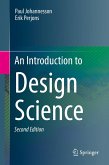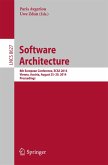This book is an introductory text on design science, intended to support both graduate students and researchers in structuring, undertaking and presenting design science work. It builds on established design science methods as well as recent work on presenting design science studies and ethical principles for design science, and also offers novel instruments for visualizing the results, both in the form of process diagrams and through a canvas format. While the book does not presume any prior knowledge of design science, it provides readers with a thorough understanding of the subject and enables them to delve into much deeper detail, thanks to extensive sections on further reading.
Design science in information systems and technology aims to create novel artifacts in the form of models, methods, and systems that support people in developing, using and maintaining IT solutions. This work focuses on design science as applied to information systems and technology, but it also includes examples from, and perspectives of, other fields of human practice.
Chapter 1 provides an overview of design science and outlines its ties with empirical research. Chapter 2 discusses the various types and forms of knowledge that can be used and produced by design science research, while Chapter 3 presents a brief overview of common empirical research strategies and methods. Chapter 4 introduces a methodological framework for supporting researchers in doing design science research as well as in presenting their results. This framework includes five core activities, which are described in detail in Chapters 5 to 9. Chapter 10 discusses how to communicate design science results, while Chapter 11 compares the proposed methodological framework with methods for systems development and shows how they can be combined. Chapter 12 discusses how design science relates to research paradigms, in particular to positivism and interpretivism. Lastly, Chapter 13 discusses ethical issuesand principles for design science research.
Design science in information systems and technology aims to create novel artifacts in the form of models, methods, and systems that support people in developing, using and maintaining IT solutions. This work focuses on design science as applied to information systems and technology, but it also includes examples from, and perspectives of, other fields of human practice.
Chapter 1 provides an overview of design science and outlines its ties with empirical research. Chapter 2 discusses the various types and forms of knowledge that can be used and produced by design science research, while Chapter 3 presents a brief overview of common empirical research strategies and methods. Chapter 4 introduces a methodological framework for supporting researchers in doing design science research as well as in presenting their results. This framework includes five core activities, which are described in detail in Chapters 5 to 9. Chapter 10 discusses how to communicate design science results, while Chapter 11 compares the proposed methodological framework with methods for systems development and shows how they can be combined. Chapter 12 discusses how design science relates to research paradigms, in particular to positivism and interpretivism. Lastly, Chapter 13 discusses ethical issuesand principles for design science research.
Dieser Download kann aus rechtlichen Gründen nur mit Rechnungsadresse in A, B, BG, CY, CZ, D, DK, EW, E, FIN, F, GR, HR, H, IRL, I, LT, L, LR, M, NL, PL, P, R, S, SLO, SK ausgeliefert werden.









